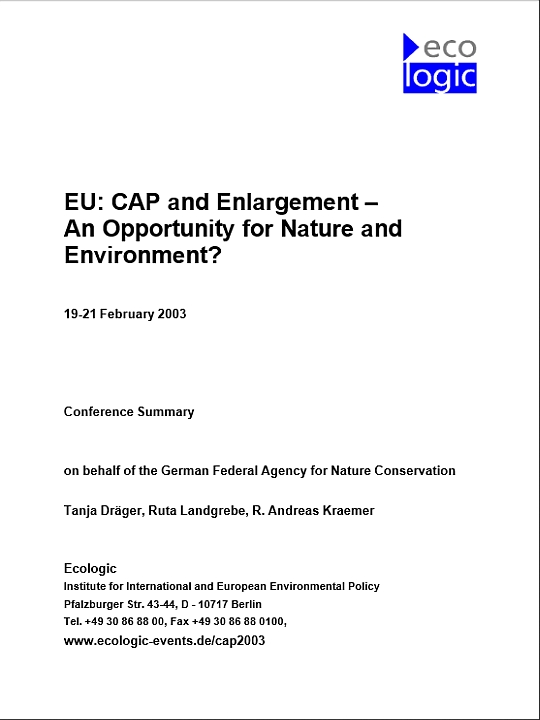EU Enlargement and the Common Agriculture Policy - Opportunities for Nature Conservation
- Event
- Date
-
-
- Location
- Potsdam, Germany
On behalf of the German Federal Agency for Nature Conservation and the German Federal Ministry of Environment, Nature Protection and Nuclear Safety an international Workshop entitled "EU: CAP and Enlargement - An Opportunity for Environment and Nature?" was carried out by Ecologic on February 19-21, 2003 in Potsdam, Germany. The primary goal of the conference was to analyse and discuss the complex interactions between EU enlargement, the Common Agricultural Policy and the related impacts on nature and environment within different scenarios.
Background
The forthcoming enlargement of the European Union poses a major political, economic and ecological challenge for the EU, the Member States and the Candidate Countries. One of the last and most difficult chapter to be discussed in the accession negotiations is the agricultural chapter of the aquis communautaire. In order to asses the impact of EU-enlargement and the Common Agricultural Policy (CAP) on environment and nature, various framework conditions and influencing elements - such as the mid-term review of the Agenda 2000 - have to be taken into consideration. The ongoing development of the CAP will result in political changes and influence the conditions under which certain instruments, such as the agri-environment measures, can be applied.
Against this background, Ecologic organised an international conference entitled "EU: CAP and Enlargement - An Opportunity for Environment and Nature?" which took place on February 19-21, 2003, in Potsdam, Germany. The conference is based upon the findings of the preparatory workshop "EU-Enlargement: Impact of the CAP on Environment and Nature", which took place in September 2001 in Bonn.
Event Objectives
The primary goal of the conference was to analyse and discuss the complex interactions between EU-enlargement, the Common Agricultural Policy and the related impacts on nature and environment within different scenarios. In several working sessions, the participants discussed and assessed the following instruments of the Common Agricultural Policy: coupled and decoupled direct payments, cross-compliance, modulation, agri-environmental programmes as well as the special support for semi-subsistence farms. In addition, the flat rate area payments have been discussed. The Conference brought together an interdisciplinary selection of around 90 experts including representatives of the Candidate Countries and the Member States from political and administrative bodies, research centres and NGOs, as well as representatives of the European Commission in such fields as EU enlargement, agriculture and nature conservation.
As part of Ecologic's preparation for the conference, a background paper was developed and a survey was conducted. The background paper presents various scenarios outlining the interactions between different aspects of CAP funding mechanisms, transition processes, land use changes and environmental impacts. In addition, different instruments of the CAP, such as direct payments, modulation or cross-compliance, as well as their related impacts on environment and nature were analysed. The primary goal of the survey was to identify the specific situation in the Candidate Countries concerning the Common Agricultural Policy (CAP), EU-Enlargement and their impact on environment and nature.
The background paper as well as the results of the questionnaire are included in the proceedings of the conference, which have been published by the Federal Agency for Nature Conservation in 2003.




